MercoPress. South Atlantic News Agency
Tag: Nicaragua protests
-
Friday, May 24th 2019 - 16:51 UTC
Opposition deems strike in Nicaragua a success
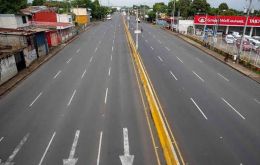
The streets of Nicaragua's main cities were empty and almost every store remained unopened during Thursday's nationwide strike which was considered a success by opposition leaders, it was reported.
-
Monday, July 30th 2018 - 12:23 UTC
The other side of Nicaragua's instability: economic growth could drop from 4.9% to 1%.
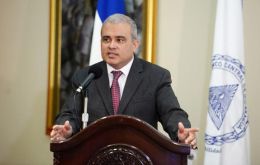
Nicaragua's protracted political crisis, which has lasted well over three months, is impairing economic growth, according to the central bank. Central bank chief Ovidio Reyes said the initial 4.9% growth forecast in gross domestic product (GDP) for 2018 could fall as low as 1% if ongoing protests continue to disrupt daily life.
-
Wednesday, July 18th 2018 - 07:12 UTC
Ortega determined to quell rebellious Masaya by Thursday, Sandinista Liberation Day
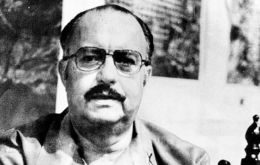
Nicaraguan national police and armed pro-government civilians laid siege to a symbolically important neighborhood that has recently become a center of resistance to President Daniel Ortega's government. Government forces began advancing on the Monimbo neighborhood in the city of Masaya before dawn Tuesday.
-
Tuesday, July 17th 2018 - 09:49 UTC
Nicaragua: UN Secretary General deplores and condemns violence against civilians

United Nations Secretary-General António Guterres on Monday deplored and condemned the ongoing violence against civilians, including against students, in Nicaragua.Speaking on behalf of Mr. Guterres at the UN Headquarters, Deputy Spokesman Farhan Haq told reporters that “the use of lethal force is not only unacceptable but is also in itself an obstacle to obtaining a political solution to the current crisis”.
-
Thursday, July 12th 2018 - 05:49 UTC
Nicaragua unrest kills 264: Ortega and opposition face each other amid crisis
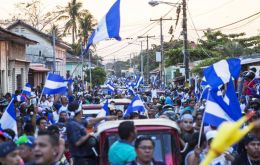
The Nicaraguan opposition will intensify its pressure against President Daniel Ortega on Thursday, with a demonstration and a general strike, but the government, in counteroffensive, prepares its revolutionary commemoration march towards Masaya, the most rebellious city in the country where at least 14 people died last weekend due a raid between pro-government paramilitary and protesters.
-
Tuesday, July 10th 2018 - 08:16 UTC
Violence in Nicaragua leaves the dialogue in suspense
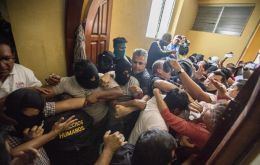
14 lives claimed the increase of violence in Nicaragua, which is about to break the the dialogue to resolve the crisis that left some 250 dead in almost three months of protests against President Daniel Ortega.
-
Wednesday, June 20th 2018 - 09:05 UTC
Ortega's paramilitary groups on shooting spree against protestors; Church dialogue backed talks collapse
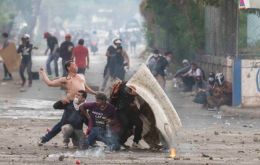
Three people were shot dead in the city of Masaya as security forces and para military groups tried to regain control of the area, a human rights group reported on Tuesday, the two-month anniversary of political unrest that has shaken Nicaragua.
-
Friday, June 15th 2018 - 16:21 UTC
Nicaragua crisis: Many seek to flee the country
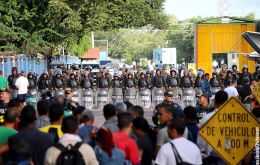
As the crisis worsens in Nicaragua, pressure on the part of society that demands the resignation of President Daniel Ortega remains. This generates that, in many cities like Masaya, the streets are blocked with more than 200 barricades while their neighbors organize to guarantee security and collect food for the protesters who are entrenched, resisting the paramilitary siege against the city. However, there has been an overflow of passport applications in recent weeks.
-
Saturday, June 2nd 2018 - 08:09 UTC
Nicaragua's husband-wife team ready to fall: end of the road for the Ortegas

By Gwynne Dyer (*) - From the Ceausescus in Romania (overthrown and shot 1989) to the Mugabes (removed in a non-violent military coup 2017), husband-and-wife teams running authoritarian regimes seem to have a particularly high casualty rate. And now it may be the turn of the Nicaraguan team: President Daniel Ortega and his wife, Vice-President Rosario Murillo.
-
Monday, May 21st 2018 - 08:42 UTC
Nicaraguan truce on the cliff after claims police attacked and shot students
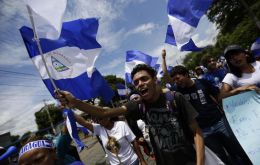
Nicaraguans were back on the streets in their thousands on Sunday to protest what they called a government breach of a two-day truce agreed during Church-mediated peace talks. Students at a university in northeastern Managua claim police attacked them during a demonstration outside the campus on Saturday night in which four students were shot and injured.
